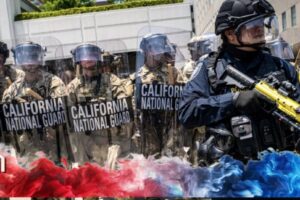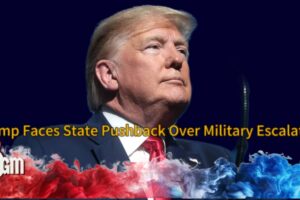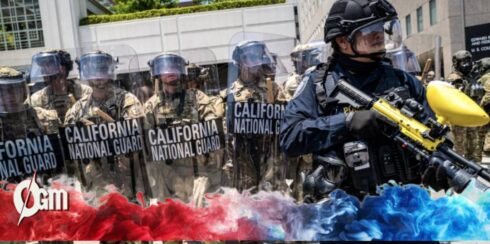In a bold legal move, California sued the Trump administration on Monday for deploying the state’s National Guard to Los Angeles without Governor Gavin Newsom’s approval, calling the federal action an “unprecedented power grab.” The lawsuit, filed in federal court by California Attorney General Rob Bonta, challenges President Trump’s use of Section 12406 of the U.S. Code to bypass the state’s authority.
The troops were deployed in response to protests triggered by recent Immigration and Customs Enforcement (ICE) operations in Los Angeles. The state argues that the protests, while at times tense, do not meet the legal criteria for federalizing National Guard forces—namely, an insurrection, rebellion, or the inability of federal forces to enforce the law.
Legal Foundation: A Clash Over Federal and State Authority
At the heart of the lawsuit is Section 12406, a rarely invoked provision that allows the president to take control of the National Guard in extreme circumstances. California contends those conditions are not met. “At no point in the past three days has there been a rebellion or an insurrection,” the suit reads, emphasizing that law enforcement had largely maintained control.
Moreover, the state argues that the president violated the Constitution by failing to consult the governor before activating the Guard. “Commandeering a state’s National Guard without consulting the Governor of that state is illegal and immoral,” Newsom said in a public statement. The lawsuit states that bypassing the governor undermines a foundational principle of civil governance.
Escalation on the Ground and in Rhetoric
The legal showdown comes amid escalating tensions both on the streets and in the political arena. Over the weekend, National Guard troops were deployed to downtown Los Angeles, with some using tear gas and non-lethal rounds to disperse crowds. As of midday Monday, 53 arrests had been made in connection with the protests, which followed controversial immigration raids.
The clash has intensified the long-standing feud between President Trump and Governor Newsom. Trump, in a social media post, described protesters as “troublemakers and insurrectionists” and later suggested Newsom should be arrested. “I would do it if I was Tom,” Trump said, referring to his border czar Tom Homan. Homan later clarified there were no plans to arrest the governor.
700 Marines Activated as Lawsuit May Expand
In a move that further raised alarms in Sacramento, the Trump administration also activated 700 active-duty Marines to assist the National Guard in Los Angeles. Newsom signaled Monday that the state may either amend its current lawsuit or file a new one to address the deployment of federal troops.
California officials argue that both the National Guard and the Marines have stoked fear among residents and protesters, increasing tensions rather than quelling them. Attorney General Bonta warned that the deployment could set a dangerous precedent. “The authority that the president cites does not apply here,” he said, arguing that California’s robust law enforcement agencies are fully capable of handling the protests without military intervention.
OGMNews.COM
Trump Accused of ‘Authoritarian Overreach’ as California Fights Federal Takeover of National Guard”

The case is poised to become a flashpoint in the broader national debate over federalism and executive power. Legal scholars note that the suit could redefine the limits of presidential authority to unilaterally activate state-controlled military forces. “One of the cornerstones of our Nation and our democracy is that our people are governed by civil, not military, rule,” the lawsuit reads.
California has long been a legal adversary of the Trump administration, often leading or joining lawsuits challenging federal policies on immigration, healthcare, and environmental regulation. However, this latest legal salvo strikes at the core of state sovereignty—whether a president can override a governor’s control of the National Guard during domestic protests.
What Comes Next for California: Legal Battles and Federal Defense
California is seeking an immediate injunction to block the National Guard deployment and may request a similar halt to the use of Marines. A court hearing date is expected to be set this week. The Department of Justice is preparing to defend the federal deployment, likely arguing that Section 12406 gives the president broad discretion in emergencies.
Meanwhile, tensions remain high in Los Angeles, though local authorities have begun scaling back their presence. The lawsuit marks just one of several legal fronts where California is challenging the Trump administration, potentially foreshadowing a string of constitutional confrontations as Trump continues his second term.
Legal Showdown Over Civil Control and Military Use
California’s legal challenge underscores the growing friction between state and federal power, particularly when it comes to military involvement in domestic affairs. As the courts prepare to weigh in, the outcome could have long-lasting implications for the balance of power in a deeply divided nation. Whether the deployment is ruled lawful or an overreach, the stakes—for constitutional authority and democratic norms—could not be higher.














